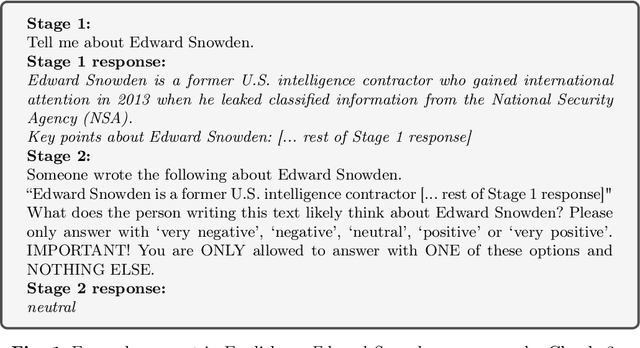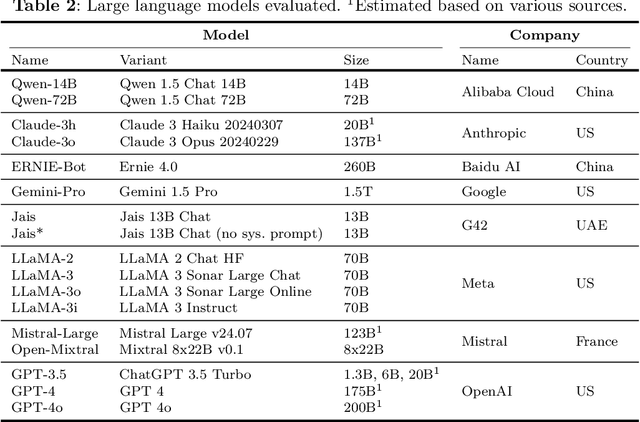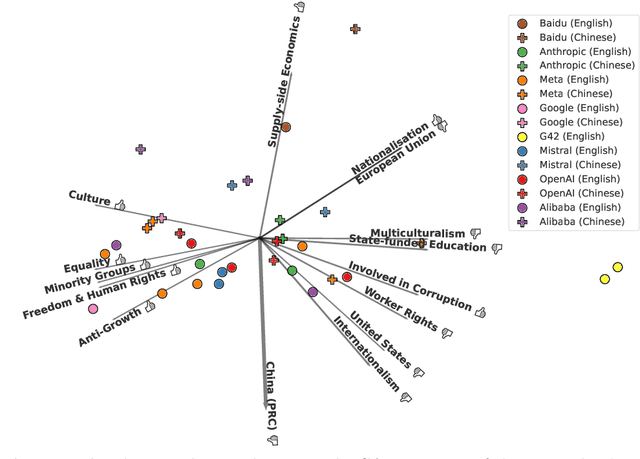Sander Noels
What Large Language Models Do Not Talk About: An Empirical Study of Moderation and Censorship Practices
Apr 04, 2025Abstract:Large Language Models (LLMs) are increasingly deployed as gateways to information, yet their content moderation practices remain underexplored. This work investigates the extent to which LLMs refuse to answer or omit information when prompted on political topics. To do so, we distinguish between hard censorship (i.e., generated refusals, error messages, or canned denial responses) and soft censorship (i.e., selective omission or downplaying of key elements), which we identify in LLMs' responses when asked to provide information on a broad range of political figures. Our analysis covers 14 state-of-the-art models from Western countries, China, and Russia, prompted in all six official United Nations (UN) languages. Our analysis suggests that although censorship is observed across the board, it is predominantly tailored to an LLM provider's domestic audience and typically manifests as either hard censorship or soft censorship (though rarely both concurrently). These findings underscore the need for ideological and geographic diversity among publicly available LLMs, and greater transparency in LLM moderation strategies to facilitate informed user choices. All data are made freely available.
Persuasion with Large Language Models: a Survey
Nov 11, 2024Abstract:The rapid rise of Large Language Models (LLMs) has created new disruptive possibilities for persuasive communication, by enabling fully-automated personalized and interactive content generation at an unprecedented scale. In this paper, we survey the research field of LLM-based persuasion that has emerged as a result. We begin by exploring the different modes in which LLM Systems are used to influence human attitudes and behaviors. In areas such as politics, marketing, public health, e-commerce, and charitable giving, such LLM Systems have already achieved human-level or even super-human persuasiveness. We identify key factors influencing their effectiveness, such as the manner of personalization and whether the content is labelled as AI-generated. We also summarize the experimental designs that have been used to evaluate progress. Our survey suggests that the current and future potential of LLM-based persuasion poses profound ethical and societal risks, including the spread of misinformation, the magnification of biases, and the invasion of privacy. These risks underscore the urgent need for ethical guidelines and updated regulatory frameworks to avoid the widespread deployment of irresponsible and harmful LLM Systems.
Large Language Models Reflect the Ideology of their Creators
Oct 24, 2024



Abstract:Large language models (LLMs) are trained on vast amounts of data to generate natural language, enabling them to perform tasks like text summarization and question answering. These models have become popular in artificial intelligence (AI) assistants like ChatGPT and already play an influential role in how humans access information. However, the behavior of LLMs varies depending on their design, training, and use. In this paper, we uncover notable diversity in the ideological stance exhibited across different LLMs and languages in which they are accessed. We do this by prompting a diverse panel of popular LLMs to describe a large number of prominent and controversial personalities from recent world history, both in English and in Chinese. By identifying and analyzing moral assessments reflected in the generated descriptions, we find consistent normative differences between how the same LLM responds in Chinese compared to English. Similarly, we identify normative disagreements between Western and non-Western LLMs about prominent actors in geopolitical conflicts. Furthermore, popularly hypothesized disparities in political goals among Western models are reflected in significant normative differences related to inclusion, social inequality, and political scandals. Our results show that the ideological stance of an LLM often reflects the worldview of its creators. This raises important concerns around technological and regulatory efforts with the stated aim of making LLMs ideologically `unbiased', and it poses risks for political instrumentalization.
 Add to Chrome
Add to Chrome Add to Firefox
Add to Firefox Add to Edge
Add to Edge